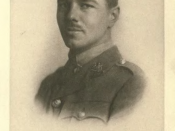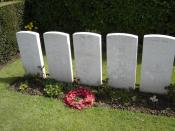Wilfred Owen is considered by many to be perhaps the best war poet in English, if not world, literature. Yet, at the time of his death on November 4, 1918, only five of his poems had been published. Thus, due to his premature death, it is clear that Wilfred Owen was not responsible for the development of his own reputation. Instead, it was through the efforts of his editors that Wilfred Owen and his poetry were not forgotten on the bloody fields of France. Indeed, I would argue that the three earliest editions of Owen's poems (Siegfried Sassoon and Edith Sitwell, 1920; Edmund Blunden, 1931; and C. Day Lewis, 1963) were responsible for establishing Owen's reputation and that reputation was reaffirmed by subsequent editions. This means that in order to understand Wilfred Owen's position in English literature, one must examine the different editions of Owen=s poems and the agendas of each editor.
The first edition of his poems, co-edited by Sassoon and Sitwell, created problems immediately, as Sitwell and Sassoon argued over control of the project. After the war, Edith Sitwell had begun to prepare the poems for publication; she had even published seven of the poems in Wheels, the magazine she edited, and was preparing to publish more. It was then that Sassoon became involved. Sitwell, in a letter dated 3 October 1919, wrote to Susan Owen (Wilfred's mother) and told her,
I wrote to Captain Sassoon, to ask him if he could
help me about them. He came to see me; and told me
it would have been your son's wish that (Sassoon)
should see to the publication of the poems, because
they were such friends. In the circumstances I could do
nothing but offer to hand them over to him (Sitwell:
20).
Then in...



War Poet
This is an example of how an essay should be--well written, documented and interesting. This is the best essay I have read at this site.
3 out of 5 people found this comment useful.